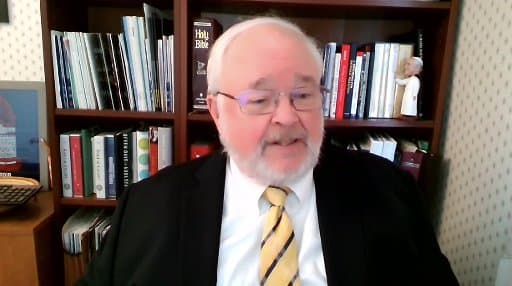WASHINGTON, D.C. — People of faith looking to see their values reflected in their politics cannot give up in the face of legislative setbacks, said members of a Feb. 1 panel, “Faith, Politics and Policy in 2022: What Is a Faithful Agenda Now?”
“We will press and press and press that those not be left out and left behind. We’re going to intervene when our values are at stake and when politics failed,” said the Rev. Jim Wallis, founder of the Sojourners community in Washington and now first chair in Faith and Justice and leader of the Center on Faith and Justice in the McCourt School of Public Policy at Georgetown University.
Wallis urged, “Speak up. Stand up. When these issues are coming to the public like in voting rights, people are going to look back on the pulpit test — whether white preachers speak about voting rights in their pulpit or not.”
The forum where Wallis spoke was sponsored by Georgetown’s Initiative on Catholic Social Thought and Public Life.
“I used to have the privilege of meeting a Methodist minister from Boston that went down to work with (the Rev.) Dr. Martin Luther King,” said Angela Espada, executive director of the Indiana Catholic Conference.
The minister, she said, would ask King, “How do you keep doing what you are doing?” He learned from the civil rights leader that “every day he prayed a prayer that the hearts of stone would be turned to flesh,” Espada explained.
“We can read the great text and say an eye for an eye would give us justification to support capital punishment. We can read the great text that says we must love everyone, forgive every sinner as Jesus did on the cross and work to disallow capital punishment,” said the Rev. Alvin Herring, executive director of Faith in Action.
“We can come to the world of politics through our faith. Be prepared — we must be prepared. That doesn’t mean the questions become easier or that our relationships become easier,” he said. “It means that we have to commit to the kind of dialogue and the kind of working together that we see very little evidence of these days.”
Also speaking during the forum was Ruth Graham, the Dallas-based national religion and values correspondent of The New York Times. Russell Moore, director of the Public Theology Project at Christianity Today and former president of the Ethics & Religious Liberty Commission of the Southern Baptist Convention, contracted COVID-19 prior to the panel and canceled his participation.
Graham spoke of a “great rescrambling” in American religion, typified by “young Protestants not really using the word ‘Protestant’ anymore” and “far-right Catholics making connections with conservative evangelicals,” which for “a few decades, it was pretty unheard of to see.”
She added, “Even the big, pro-Trump Republican pastors were for (coronavirus) vaccines,” among them the Rev. Franklin Graham (no relation). But other Christians who are against vaccines couch it “in terms of their own faith and making arguments this was a religious issue for them. And what they are doing is finding faith leaders online or in smaller communities to basically sign the paperwork” exempting them from a vaccine mandate, Graham said.
“I don’t like the term ‘religious left.’ It is making our faith binary. It is politicizing our faith,” Wallis said. “I like to say don’t go right, don’t go left. Go deeper. Deeper into the values.”
“I would like to focus on bringing empathy to the public forum,” Espada said. “With empathy we can welcome and take care of the sick. We could see the value of all people.”
She added, “Think of Catholic with a small ‘c’ and the universal approach, because the foundation of Catholic social teaching are things that work for everyone. Support for the common good. Respecting the dignity of life. Solidarity. Or you can say empathy instead of solidarity.”
There was no shortage of issues identified during the forum that are in legislative limbo.
Herring mentioned racism, white supremacy and the environment. Wallis has already assembled a faith-based coalition focusing on voting rights.
Espada mentioned two issues: the death penalty and guns. “There were 13 executions” in Indiana in the past year, she said. “That takes a toll on the people and the victims’ families, the families of those who are on death row,” she said.
On guns, Espada said, “we’re trying to join other states to fight back what people call ‘institutional carry.’ You can have a handgun without a license. We know in places where they don’t have background checks and licenses, suicides go up. And homicides with handguns go up. And that takes away life.
“And so we try to impress upon people that you have to have empathy and you also have to truly respect life in all of its forms.”
John Carr, co-director of the Initiative on Catholic Social Thought and Public Life and forum moderator, broke in at one point to lament the fate of the expanded federal child tax credit.
The American Rescue Plan, enacted in March 2021, expanded the existing child tax credit and more families with children than ever before became eligible to receive the monthly payments.
This enhanced program was included in Biden’s proposed Build Back Better plan, but it has expired since Biden’s measure failed to pass. The child tax credit program is now smaller, having gone back to what it was before the pandemic.
Carr said the expanded credit “lifted people out of poverty and helped the poorest people, (and) is disappearing without a trace. It stopped in December” and it “was a centerpiece to the Build Back Better bill,” he noted. “Now it looks like it might not be a part of it.”
“It is a pro-family and pro-life measure,” Carr said. “The religious community is trying to lift it up. I’m afraid it could well be lost in the polarization of the moment.”














